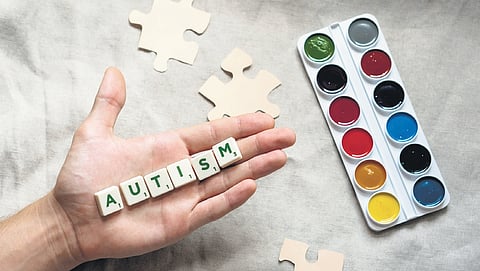

CHENNAI: A 2021 study published in the Indian Journal of Pediatrics estimates that 1 in 68 children in the country are affected by Autism Spectrum Disorder (ASD). The prevalence of autism is higher in boys than in girls, with a male-to-female ratio of about 3:1. “In the last 20-30 years, the commonness of autism has increased. Earlier, it was one to two per cent, but now, it is up to 5-6%,” says Dr Jaichitra Suresh, senior consultant, department of family medicine, MGM Healthcare. This Autism Awareness Month, CE looks at the effects of climate change on expecting mothers and children with autism.
Autism is a neuro-developmental disorder, a lifelong condition where the cause is usually unknown. Various factors may lead to it. “Some 100 genes have been studied to find out the origin, but the results are not specific. Genetic predisposition with environmental and biological factors leads to the problem. The brain development starts in the first trimester. So there was a proposal to see if the birth month of the child has a result on the increase the risk of autism,” she says.
Mothers, take notes
Dr Jaichitra notes that studies conducted in Finland and Sweden show that if a child is born during the fall month (August), the risk of autism is increased. Whereas, it is decreased in the spring months (April). When the same study was conducted in Denmark, Norway or Australia, there was no correlation between the season and the month of childbirth. “For a child to be born in summer, the mother has to conceive in winter, the season of increased risk of viral infections. Whether that affects brain development in the child has to be looked into,” she shares.
Stressful life events of the mother during pregnancy can also influence the brain development of the child. During this stage, Vitamin D is also equally important. Its deficiency can also be a factor. “The mother has to balance it out. She has to have adequate exposure to the sun. Also, seasonally there will be some changes in the mother’s food habits. It is not possible to consume every fruit and vegetable throughout the year. When there is a change in consumption it affects childbirth,” says Dr Jaichitra.
Other reasons, including maternal obesity and gestational diabetes mellitus, can also be resulting causes. The mothers-to-be should adapt themselves to the environment and have a balance of physical activities and diets. “It is also advised that the mothers take rubella vaccinations to reduce the risk of the disease on the unborn child,” adds the doctor.
Children characteristics
A child with ASD cannot express what he/she needs or wants. They have issues with adapting to new situations, social interaction, and communication, both verbal and non-verbal. Many tend to repeat a certain behaviour and others contemplate doing the same activity. Along with that, children with autism are prone to sensory difficulty, and climatic changes such as extreme cold or heat waves are likely to have an impact on the behaviour of the child. “Clothing is most common and it differs from season to season. These kids have problems with certain kinds of clothing, wherein certain differs from person to person,” explains Jaichitra. Disliking certain foods because of the texture or the colour.
Sensory difficulty includes walking under the sun, as “high-end autistic people may be seeing it in patterns. The sensory issues are challenging to assess because they won’t be in a position to tell us this is what is bothering them.” A solution to this can be talking and helping them prepare for the change in environment. “When you make them feel comfortable for what is about to happen, it can be attending a family function or getting a haircut, it takes time for people with autism to process things but when you sit closer and explain, improvement can be noticed,” opines Dr Jaichitra as she asks us to empower autistic voices, the theme of 2024.